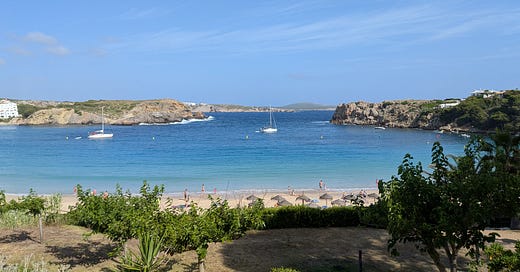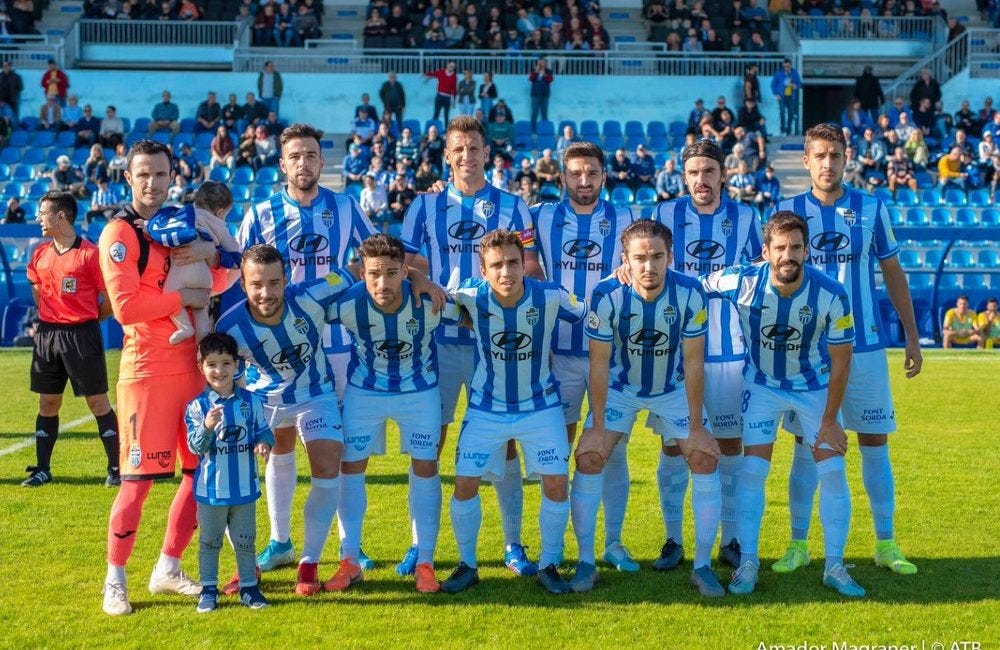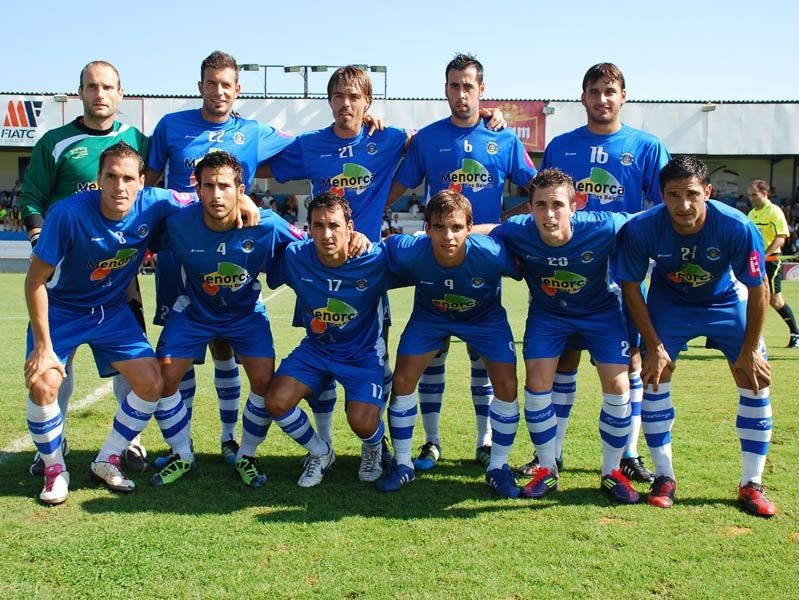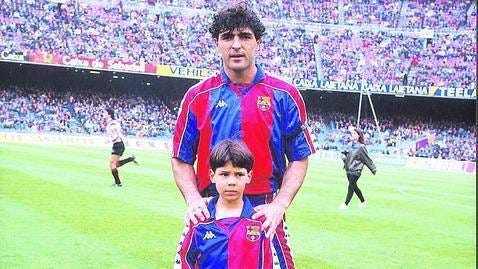State of play: Regions of Spain, Balearic Islands
Spain is made up of 17 unique and autonomous regions and regional pride is often as big as national pride in what can often feel a fragmented and divided country.
The Balearic Islands is one of those places that changes how it's viewed based on the lens you look at the islands.
For some it's a holiday paradise to take your family, for others it's a boozy stag do or hen do, for others it's a perfect place to take the bike and travel across the islands and for some it's a place of tranquility and isolation.
There is more though than just tourism, over a million live on the islands that have had geo strategic importance for centuries and in the midst of a crisis and protests against tourism in the region, football thrives in the region.
Mallorca’s population in particular has hugely increased with a growth of 20% in the last 25 years, while the islands are dependent on tourism, locals feel the balance has gone too far the other way. Protests are growing louder and more prominent with locals being priced out of accommodation as the demand for ever more tourist money and places to stay goes up.
The protests aren’t necessarily against tourism as there is an understanding the economy depends on it but the over-tourism and greed associated with this.
Parts of Spain have been under water bans over the last decade and whilst locals are banned from watering their garden down the road hotels will have waterparks and swimming pools filled adding to the sense of locals that they don’t matter.
The Islands also speak a unique type of Catalan known as Balearic Catalan and each major island has it’s own dialect be it Mallorqui (Mallorca), Eivissenc (Ibiza) Menorqui (Menorca). Almost 900,000 of the population claim to be able to understand Balearic Catalan or Catalan.
With that background it feels right to now jump into the football in the region.
The giants
The Balearics are dominated by Mallorca and so is the football, Real Mallorca or Mallorca as they're commonly known dominate the region and much of the spotlight.
The club has almost 70 seasons in the top two divisions, a proud record in Europe and a Copa del Rey in its trophy cabinet.
The club was founded 13 seasons before La Liga was created in 1916, until the Spanish republic in 1931 the club was named after King Alfonso XIII.
The region has always had historic links with Catalunya with Catalan an official language and the club played initially in the Catalan leagues.
After the civil war the club entered the national leagues playing in Segunda and it took until 1960 for the island side to become a La Liga side.
Mallorca were a yo-yo side and it took until the 90s for them to truly establish themselves as a force in La Liga.
The hiring of Argentine coach Hector Cuper was a game changer and Mallorca lost the Copa del Rey final to Barca on penalties.
That defeat was good enough to see them qualify for Europe and the Cup Winners Cup where they went again all the way but lost to Lazio at Villa Park in a game that registered with people in the UK.
As tourism picked up through the 60s and ex-pats continued to move to the Balearics the clubs international fanbase grew. The club has big support from the British and German communities that have moved to the island.
Those who had moved over experienced moments of unprecedented glory with Mallorca finishing third in 1999 and 2001.
The best was yet to come with the Copa del Rey victory in 2003 against Recreativo Huelva in one of the most unexpected pair of finalists in the competitions history.
That win was spearheaded by the dynamic duo of Samuel Eto’o and Walter Pandiani.
In truth though that title was a surprise as Mallorca had dropped down in La Liga and the days of finishing third were long gone.
As Eto’o left for Barca and the glory that brought Mallorca became a mid-table side.
They were still the bastion of the region but the days of challenging the establishment were beyond them and relegation came in 2013.
This was a time of the up-starts of the 90s and early 00s such as Mallorca and Depor struggling paying the price for the success they'd had in the years before.
While American ownership came in through Andy Kohlberg and Steve Nash plus others the worst was to come with relegation to the third tier for the first time since 1981.
The owners though had a plan and gradually things came together the club did back to back promotions something almost unprecedented in Spain and while they went back down the foundations were there. The club returned quickly back to La Liga and has been moving in an upward trend with a Copa del Rey final and more and more investment into the team and facilities.
The club has hugely improved San Moix making it fan friendly, they still have a group of players from the Balearics which is always important for the identity of these island clubs.
The forgotten rivals
Many might think of Mallorca as homogeneous and dominated by RCD Mallorca but that isn't entirely the case.
In the shadow of their more illustrious neighbours is Atlético Baleares who have historically been the second team in the region. The clubs have a fierce rivalry and the relegation to the third tier of Mallorca allowed the rivalry to be renewed for a new generation of supporters who had never experienced it.
Like Mallorca, Atletico Baleares are based in Palma but unlike Mallorca they've never experienced the limelight of La Liga.
Segunda has been the ceiling for Baleares who have had 4 seasons in the second tier and have often found the third and fourth tier as their spiritual home.
They have a passionate fanbase despite rarely having tasted the success of their rivals.
In recent seasons Baleares have had a decent budget with the club becoming a corporation and allowing outside investment.
Many have viewed the club as ripe for potential with a German business man who lived in Mallorca being one of the many majority shareholders since the club converted into a SAD.
The promise of Segunda hasn't come though and in recent seasons the fanbase has increasingly become disillusioned with the ownership of the club and in 23/24 the club dropped out of the third tier and into the fourth.
This is where the club remains, the dream of Segunda seems a distant memory and the shadow cast over them by their rivals Mallorca is arguably as big as it's ever been.
Party everywhere but on the pitch
Ibiza is an island that is known around the world. It has a historic nightlife and reputation as the place to go if you like dance music.
What it's not known for is it's football, again this is an island with a wealthy ex-pat population and many have dreamed of putting the club on the map.
One man Amadeo Salvi has come closer than most though. Salvi was previously the president of Valencia before migrating east to set up his own team UD Ibiza in 2015.
There had previously been a club called UD Ibiza-Eivissa and the new club paid off the debts to use the old clubs badge.
Having started at the smallest level of Spanish football within two years they'd made Tercera or the fourth tier.
That though wasn't the end goal and when Catalan club Lorca were refused entry to the third tier Ibiza paid a fee to take their spot.
This is unfortunately quite common in Spain and even more so with clubs with ambition, Estepona from Andalucia paid €500k to jump up a level.
The club and the island was seen as an attractive prospect and DAZN commissioned a documentary on the club with dance music set as the background throughout. The documentary even featured frequent visitor to the island Ronaldo Nazario.
Having made the third tier in 2018, in 2021 they went a step further achieving promotion to Segunda.
That first season in Segunda they were a real novelty given their location and much was made of their appearance in the second tier.
They also played expansive football highlighted in particular by a 0-5 demolition at a toxic La Rosaleda over Málaga.
That first season saw Paco Jemez a real free spirit and maverick of a coach come in halfway through and galvanise them to safety.
For whatever reason though both parties couldn't agree to a new contract so he left and Ibiza were rotten in that second season.
Lots of newly formed clubs don't have the most loyal fanbases and that second season highlighted that with a sparsely populated Can Misses as Ibiza suffered defeat after defeat to end the 22/23 season second bottom and relegated.
The air hasn't gone out of the project though and they've finished in the play-offs every season since their relegation but have yet to return to Segunda.
Ticket sales still aren't easy in Ibiza with the ground often half full, while the island is often swarming with people during the summer in the winter time many leave leaving the island mainly to the locals.
During the summer the population can be estimated to be 2 million with the influx of holidaymakers whereas outside of the tourist season it goes down to just 160,000.
There is plenty of other sides on the island but none have made the impact this small upstart has done in the last few years.
Smaller island
Menorca got it’s name for the size of the island in contrast to Mallorca. The island has passed through many hands with plenty of reminders of British ownership when you visit the port of Mahon or Maó as it’s known in Catalan.
When it comes to football the island has plenty of teams and that is part of the reason as to why we’ve never seen a team from the island in the top three tiers, with so many teams comes split loyalties and with a population of just under 100,000 that leaves football fragmented.
The brilliant Menorca football website ran by James Gordon chronicles football on the island. He told me about the project of Sporting Mahones to try to unite the island behind one team and professionalise football on the island but it just resulted in three separate teams.
Even Ciutadella the islands second biggest city with a population of 29,000 has numerous clubs and three have merged to make one team but their still remains Penya Ciutadella on the outside.
With so many clubs and no apparent want on the island to unite behind one team and with such a small population we might never see a Menorca side reach the heights of even at Atletico Baleares and you know what that might just be ok to those in Menorcan football.
Players
Plenty of footballers have been produced from the region and some have made a huge impact. Rafa Nadal was known as a brute on the tennis court who ground his opponents down the opposite of the graceful and artistic Roger Federer.
What you might not know is a player from the Mallorca had a similar reputation in football Miguel Angel Nadal, Rafa’s uncle. Miguel played in defence and midfield and had a long career in La Liga making over 200 appearances for Barca playing under Cruyff’s dream team.
After starting his career at Mallorca he also finished it there winning the Copa del Rey in 2003. With uncles like Miguel and his coach Toni it’s no wonder Rafa was such a competitor in his own career.
Again when it comes to the islands, Mallorca dominates when it comes to player production. They also produce all types of players, from enforces such as Miguel Angel Nadal to playmakers such as Marcos Asensio and flying wingers like Albert Riera.
When it comes to Menorca and Ibiza the production line isn’t the same but again a lot of it comes down to population. Players such as Sergi Enrich and Leo Roman are current players from both regions.
State of play
The region appears to be in relatively good health, Mallorca continue to establish themselves again as a top flight side with a core of players from the region. Ibiza are still challenging and whilst they once again missed out in the play-offs they will be competitive once again next season in the third tier. Atletico Baleares are waiting in the wings of the fourth tier and while the fans are disillusioned with the effects of becoming a corporation hopefully their time will come again. When it comes to Menorca football might be fragmented but sometimes there is nothing wrong with local pride in the village team and not harboring ambitions of being in the top three tiers and all that entails.













Really enjoy these. Great work!
Love these regional pieces, but was surprised that there was no mention of the great Juan Arango at Mallorca. Oof, what a player!